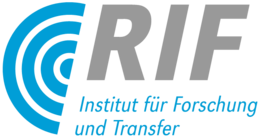smartMTQM
Simplification of the MTQM procedure for low-threshold applicability in SMEs (Project processing ist carried out by RIF e.V., Production Systems Department)
Problem
Assembly activities are a fundamental part of the value chain and represent a key element across all industries for generating stable and efficient production processes. In order to achieve a high level of quality, production processes are required that can be executed both economically and in a process-safe manner, i.e. with minimal errors. In manual assembly, the occurrence of errors is primarily manifested by human handling errors (e.g. interchange errors, omission errors, perception errors, etc.). In the context of planning manual assembly processes, it is therefore necessary to deal both with the methods of time planning, e.g. systems of predetermined times, and with the methods of predicting human reliability. For this purpose, the Methods-Time and Quality Measurement MTQM tool has been developed in the Process Optimization department of RIF e.V.. The application of MTQM requires a high level of methodological competence, so that the execution of MTQM analyses is a major obstacle.
Objective
The aim of this project is to develop a simplified screening tool that makes it possible to determine the risk of human-induced manual assembly errors in a low-cost and low-threshold manner. By means of a simplified MTQM tool, manufacturing companies should be able to identify workplaces and process steps with an increased probability of human assembly errors in a simplified way. To simplify the MTQM method, existing configurations in manual assembly are to be formed with regard to mental and physical stress as well as other environmental factors. In addition, other factors such as task complexity and difficulty will be included and assigned to defined error probabilities. The output of the screening tool is a ranking of the analyzed assembly workplaces according to their error potential.
Approach
The project is divided into five work packages. The work is carried out by one expert from each of the departments Process Optimization and Work and Production Systems of the RIF e.V..
In the first step, relevant influencing variables on the human error probability in assembly processes are determined by literature research and expert interviews. For simplification, these influencing variables are grouped. After the development of standardized questions for the grouped influencing variables, the calculation model and the software tool for the application support of the smartMTQM method are developed. This is followed by the validation of the developed smartMTQM method against the expert method MTQM.
Research, Development and Application Partners
Funding Reference
This research project is being carried out with funds from the budget of the Federal Ministry of Economics and Climate Protection (BMWK) via the German Federation of Industrial Research Associations "Otto von Guericke" e.V. (AiF) on behalf of the Gesellschaft für Innovative Betriebsorganisation e.V. (GBO).


![[Translate to English:] [Translate to English:]](/storages/zentraler_bilderpool/_processed_/2/6/csm_Altes_Maschinenbau-Gebaeude_3a1a87015a.jpg)
